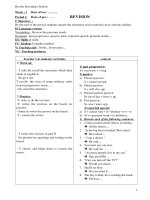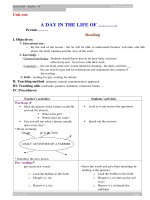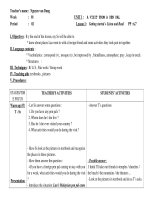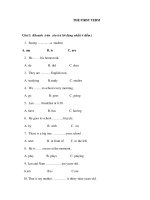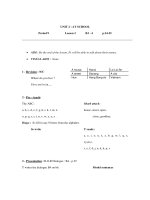giao an unit11 lop11 languagefocus
Bạn đang xem bản rút gọn của tài liệu. Xem và tải ngay bản đầy đủ của tài liệu tại đây (279.4 KB, 6 trang )
LESSON PLAN
UNIT 11: SOURCES OF ENERGY
PART E: LANGUAGE FOCUS
I. OBJECTIVES:
By the end of the lesson, students will be able to:
- pronounce words containing three cluster consonant sounds /ʃr/, /spl/ and /spr/, and distinguish
them.
- practice saying sentences with those sounds in meaningful context.
- review the relative clauses replaced by participles and to infinitives structures.
- apply these structures and use them appropriately.
II. TIME: 45minutes
III. TECHNIQUES: pair and group works, question and answer, and game.
IV. LEXICAL ITEMS AND STRUCTURES: Relative clauses replaced by participles and to
infinitives
V. TEACHING AIDS: pictures, textbook, chalk, word cards.
VI. PROCEDURES:
Stages
Pronunciatio
n (12
minutes)
Teacher’ activities
-T shows three pictures and asks Ss some questions:
Students’
activities
-Listen to the
teacher
-Answer the
question
-Repeat the words.
1
In which season can we see this flower? (picture 1)
Do you know what is it? (picture 2 + 3)
Suggested answer:
Spring, spleen, shrimp
-T leads to the lesson: Today we will learn three sounds /ʃr/,
/spl/ and /spr/.
- T pronounces the words in the textbook and asks Ss to
repeat the words.
-T asks Ss to read 6 sentences in the book and lists all the
words that contain these 3 sounds.
-T calls some Ss to go to the board and writes all the words
they found in the suitable columns.
Suggested answer:
/ʃr/: shrieking, shrugged, shrimp
/spl/: splendid, splits, splays
/spr/: spring
-T asks Ss to read all the sentences one more time.
-T listens and corrects.
Grammar
(33 minutes)
1.Relative clauses replaced by present participles
-T shows a picture.
-T has Ss make a sentence using relative clause.
-Listen to the
teacher
-Take note
Do you know the man who is taking photo?
-T change the sentence:
-T elicits:
Do you know the man who is taking photos?
Relative clause in active voice
2
Do you know the man taking photos?
Present participle
E.g2:
The tables which belong to my class are made of wood.
The tables belonging to my class are made of wood.
-T gives the rule:
We can replace a relative clause in active voice by a present
participial (V-ing) phrase.
who/which/that+ Vactive V-ing
-T asks Ss to do exercise 1 (sentence 1 +6)
-Then T introduces a game. The game will be played in all
activities.
T divides class into 4 groups.
-do the exercise
T gives each group 200 points.
-play game
Two fastest groups which have the answer for the exercise
will run to the board and write their answer. If the answer is
correct, they will have chance to choose one number from 1
to 12.
1
2
3
4
5
6
7
8
9
10
11
12
Behind each number there is one symbol.
If they choose the number that carries:
+100: the team will get 100 points
+200: the team will get 200 points
They can steal points from the other teams
(maximum 100 points)
Their current points will be deleted.
3
They can exchange their scores with
another team.
They can delete another team’s points.
(maximum 100 points)
Suggested answer:
1. The boy playing the piano is Ben
6. We have an apartment overlooking the park.
2. Relative clauses replaced by past participles.
-T gives an example:
The cakes which are made by my mother are delicious.
-T says that we can change this sentence into:
The cakes made by my mother are delicious.
-T elicits:
The cakes which are made by my mother are delicious.
-listen and take
note
-do the exercise
Relative clause in passive voice
The cakes made by my mother are delicious.
Past participle
-T presents the rule:
We can replace a relative clause in passive voice by a past
participial (Ved/V3) phrase.
who/which/that+ V passive Ved/3
-T asks Ss to do task 2 on page 132 (sentence 3+6)
-Ss continue playing the game.
Suggested answer:
3. They live in a house built in 1890.
6. They work in a hospital sponsored by the government.
3. Relative clauses replaced by to infinitives
-T gives a picture and asks Ss:
Do you know who is he? What do you know about him?
-listen and take
note
-do the exercise
4
Suggested answer:
He is Neil Armstrong.
Neil Armstrong is the first person that walked on the moon.
Or we can say
Neil Armstrong is the first person to walk on the moon.
-T elicits:
Neil Armstrong is the first person that walked on the
moon.
Active Verb
Neil Armstrong is the first person to walk on the moon.
E.g 2:
The last idea which is presented in the book is interesting.
Passive verb
The last idea to be presented in the book is interesting.
-T sets the rules:
We can replace a relative clause following the first, the
second, the last, the only, superlatives... by an infinitive
phrase.
The first/second…(ordinal number)
The last/ only/next
Superlatives
+ who/which that+ Vactive
The first/second…(ordinal number)
The last/ only/next
Superlatives
+ toV
The first/second…(ordinal number)
5
The last/ only/next
+ who/which that+ Vpassive
Superlatives
The first/second…(ordinal number)
The last/ only/next
+ to be V3/ed
Superlatives
-T asks Ss to do task 3 (sentence 2+4)
-Ss continue playing the game.
Suggested answer:
2. The last person to leave the room must turn off the light.
4. This is the second person to be killed in that way.
-T delivers a handout in which there are 5 sentences.
-T has Ss do the exercise and continue playing the game.
-T gives feedback.
Suggested answer:
1. The girl wearing a pink dress is waiting for the bus in the
rain.
2. Applications sent after 23rd will not be considered.
3. Maxicorp was the only company to reply my letter.
4. The sunlight coming through the window wakes me up
early every morning.
5. The fifth man to be interviewed was entirely unsuitable.
Homework
Review the lesson
Do others exercise
Appendix: handout
Re-write the sentences, using Present Participle, Past Participle or Infinite.
1. The girl who is wearing a pink dress is waiting for the bus in the rain.
……………………………………………………………………………………………………………………….
2. Applications which were sent after 23rd will not be considered.
……………………………………………………………………………………………………………………….
3. Maxicorp was the only company that replied my letter.
……………………………………………………………………………………………………………………….
4. The sunlight which comes through the window wakes me up early every morning.
……………………………………………………………………………………………………………………….
5. The fifth man who was interviewed was entirely unsuitable.
……………………………………………………………………………………………………………………….
6

